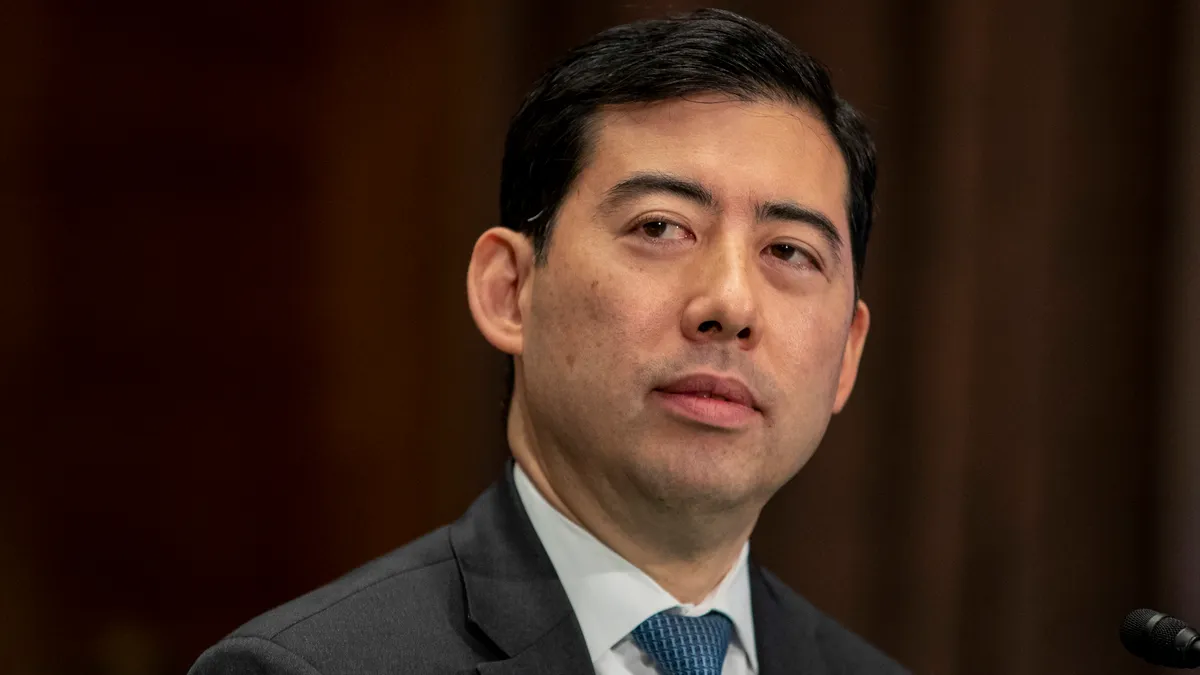Disney has significantly pared back its federal lawsuit against Florida Governor Ron DeSantis and other officials alleging retaliation for its opposition to controversial education legislation opponents labeled the “Don’t Say Gay” bill.
An amended complaint the company filed Thursday includes just one cause of action: an allegation that the defendants violated the First Amendment in their multi-pronged response to Disney’s criticism of a now-law prohibiting classroom discussion of sexual orientation or gender identity in early grades.
The alleged retaliation includes DeSantis and the state legislature dissolving the governing jurisdiction for Disney and reconstituting it with members handpicked by the governor.
“A targeted campaign of government retaliation—orchestrated at every step by Governor DeSantis as punishment for Disney’s protected speech—now threatens Disney’s business operations, jeopardizes its economic future in the region, and violates its constitutional rights,” Disney’s amended complaint said.
“This is as clear a case of retaliation and weaponization of government as this Court is ever likely to see,” the second amended complaint also said.
DeSantis, a Republican running for his party’s presidential nomination, disputed Disney’s allegations when asked about the amended lawsuit focused on the First Amendment.
“They're obviously going to lose that claim,” DeSantis said during an interview on Fox News Channel. “It's a bogus claim. These were acts of the Florida Legislature. They had every right to make sure that Disney's living under the same laws as every other company paying taxes, following the law.”
Last month, DeSantis had urged Disney to drop its lawsuit.
The other defendants in the case include Meredith Ivey of the Florida Department of Economic Opportunity and board members and the administrator of the Central Florida Tourism Oversight District.
The district known as CFTOD replaced the Reedy Creek Improvement District, which was Disney’s local governing jurisdiction for decades.
In a motion to dismiss Disney’s complaint filed before the recent amendment, the Florida Attorney General’s office argued that DeSantis and Ivey are immune from suit.
Meanwhile, attorneys for the CFTOD defendants argued in a prior brief seeking dismissal that “Disney does not have a First Amendment right to its preferred governance structure for the district in which it is located.”
“To the contrary, that is a fundamental matter of state sovereignty that the First Amendment does not restrict,” attorneys from Cooper & Kirk wrote in a brief filed in late June.
Alexei Woltornist, a spokesman for the CFTOD, said the district was “pleased that Disney backtracked on these legal claims against the district in their federal case.”
“Disney’s latest legal move puts them in line with the position of what the district has been advocating for months now: that these matters should be decided in state court,” Woltornist said in a prepared statement. “We hope this helps expedite justice for the people of Florida.”
The federal case is pending in the Northern District of Florida before U.S. Judge Allen Winsor.
Contract claims
Disney originally sued the defendants in federal court in late April of this year in a complaint featuring five causes of action.
Disney’s amended complaint eliminates three causes of action focused on the new governing board’s abrogation of two long-term land use contracts for Disney.
It also eliminated a second First Amendment claim that alleged retaliatory interference with contracts.
Dueling legal claims about the contract issues are still playing out in state court, and the defendants had previously suggested in legal briefs that was the proper venue for those matters.
"We will continue to fight vigorously to defend these contracts, because these agreements will determine whether or not Disney can invest billions of dollars and generate thousands of new jobs in Florida," a Disney spokesperson told ABC News in a statement.
Disney said in its original complaint that it plans to invest more than $17 billion in Walt Disney World over the next decade.
Disney did not immediately respond to a Legal Dive request for comment on Friday on its scaled-back lawsuit.
Disney is represented in the federal suit by attorneys from O'Melveny & Myers, WilmerHale and Losey PLLC.
‘Don’t Say Gay’ bill
Disney’s remaining First Amendment claim focuses on two pieces of legislation approved by the state Legislature and signed into law by DeSantis in the aftermath of Disney speaking out against Florida’s Parental Rights in Education bill.
The most prominent part of the high-profile bill prohibited classroom discussion of sexual orientation and gender identity through the third grade.
In March 2022, Walt Disney World issued a statement that said in part that it opposed “any legislation that infringes on basic human rights, and stand in solidarity and support our LGBTQIA+ Cast, Crew, and Imagineers and fans who make their voices heard today and every day.”
DeSantis signed the parental rights bill into law on March 28, 2022.
The next day Disney issued a statement saying the bill “should never have been signed into law,” and that its “goal as a company is for this law to be repealed by the [L]egislature or struck down in the courts.”
DeSantis followed up by saying Disney’s recent statement “crossed the line” and pledged “to make sure we’re fighting back.”
Alleged retaliation
In April 2022, the Florida Legislature passed Senate Bill 4C in a special session. The legislation dissolved the Reedy Creek Improvement District or RCID. DeSantis signed it into law.
Earlier this year, the Legislature passed House Bill 9B, which allows the governor to select members of the governing board overseeing Disney’s local jurisdiction.
Previously, under RCID’s charter, board members were chosen through an election in which all landowners in the district were allotted one vote per acre of land owned in the district, according to Disney’s lawsuit.
House Bill 9B also prevented the improvement district’s dissolution and continued the district’s existence under a new name: the Central Florida Tourism Oversight District.
In late February, DeSantis signed the House bill into law. A press release DeSantis’ office issued about the bill was titled: “Governor Ron DeSantis Signs Legislation Ending the Corporate Kingdom of Walt Disney World.”
“There is no room for disagreement about what happened here: Disney expressed its opinion on state legislation and was then punished by the State for doing so,” the company’s amended lawsuit said.
Proposed remedies
Disney is requesting that the federal judge declare Senate Bill 4C and House Bill 9B unlawful and unenforceable because they were enacted in retaliation for Disney’s political speech in violation of the First Amendment. The company is also seeking an order enjoining the defendants from enforcing those laws.
Additionally, Disney is seeking its attorney’s fees and costs, as well as any other relief the court deems just and proper.
Judge Winsor has given the defendants 14 days to respond to the second amended complaint.
“Alternatively, if the parties wish to stipulate that the earlier motions to dismiss, response, and replies (to the extent applicable to the remaining claim) should be directed to the Second Amended Complaint, they may file a joint notice saying so, and the court will address those arguments as applied to the new pleading,” Winsor wrote in an order issued Thursday.



















